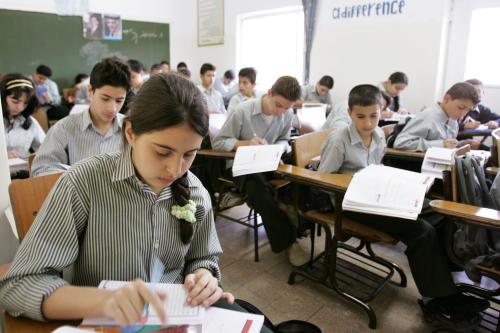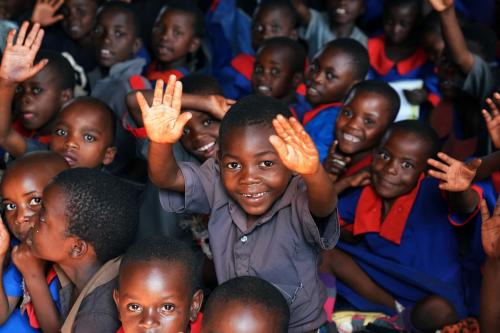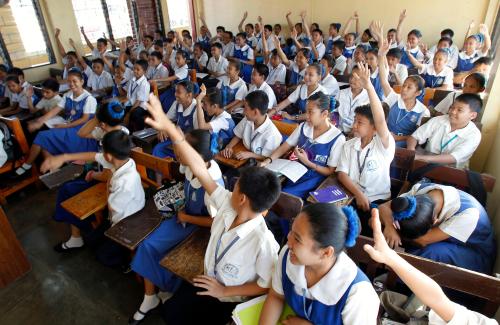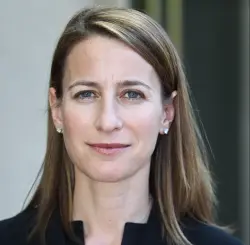It is no longer a secret that far too many children are not learning around the world. The learning crisis is particularly acute in sub-Saharan Africa where 40 percent of grade 2 students cannot do a one-digit addition problem. Botswana is a prime example. While access to education is at an all-time high, with a net enrollment of 91 percent, learning levels are far below grade-level expectations and stagnating. An analysis of learning levels among grade 5 students conducted in 2017 found that over 85 percent of students could not divide, and half of students could not read a simple story. Despite striking challenges in learning, Botswana has the resources and political will to invest in programs that can close the gap for students who have fallen behind. The current 2015 – 2020 Education and Training Sector Strategic Plan (ETSSP) calls for education reform and commits to resourcing efforts to improve and support remedial learning.
Scaling quality education through Teaching at the Right Level
In an attempt to change the status quo, Young 1ove, an NGO founded to scale evidence-based programs for youth, is working with the Botswana government to adapt an approach called “Teaching at the Right Level (TaRL).” TaRL uses learner-centered teaching methods to target students’ basic literacy and numeracy learning needs, grouping children by level rather than age or grade. This approach stands in stark contrast to typical schooling methods in which students are taught lecture-style and moved to the next grade automatically each year, regardless of learning gains.
Pratham—an NGO in India—developed this learner-centered approach and over the past 20 years has partnered with the global research center J-PAL to evaluate the program in multiple randomized trials across Kenya, India, and Ghana. Over time and across countries, TaRL has proven to be one of the most cost-effective ways to improve learning.
In 2018, Botswana’s Ministry of Basic Education (MoBE) signed a 4-year Memorandum of Understanding with Young 1ove to scale TaRL in three regions and develop a plan for national scale. Since then, Young 1ove, in partnership with MoBE, the Ministry of Youth Empowerment, Sport, and Culture Development, and UNICEF, has piloted and implemented TaRL in 10 percent of schools across Botswana. Early results from these efforts are promising. The most recent results from the last round of implementation reveal that over 82 percent of participating students gained numeracy skills, the percentage of students who can do division jumped from 12 percent to 76 percent, and the percentage of innumerate students dropped from 13 percent to 1 percent after 30 hours of TaRL instruction.
Scaling in Botswana: A cross-sector coalition
To learn from and support scaling TaRL in Botswana, the Center for Universal Education (CUE) at Brookings has partnered with Young 1ove to launch a Real-time Scaling Lab, convened by the Ministry of Basic Education. The Real-time Scaling Lab is not a physical space but rather a multi-year process that brings together a small group of diverse stakeholders to systematically plan for scale from the start, periodically reflect on progress, and adjust plans based on data and ongoing learning. The lab also provides an opportunity to document the adaptation and expansion of TaRL in order to inform other scaling efforts in Botswana and globally.
The Ministry of Basic Education launched the Real-time Scaling Lab in Gaborone, Botswana in September 2019, bringing together over 30 stakeholders from government and civil society in a half-day workshop led by Director of Basic Education, Mr. Ndondo Koolese. This convening identified the underlying causes of low learning outcomes in Botswana and considered how TaRL can help address them. Discussions revealed that TaRL’s promise and potential may lie in its innovative, yet intuitive pedagogies and organic, demand-driven expansion.
Going back to the basics
In many ways, the TaRL approach taps into a “back to basics” mindset, encouraging us to revisit teaching and learning methods that draw upon an intuitive understanding of how humans learn best: practically, with peers in an engaging and targeted learning environment. Not only do educators report that TaRL reminds them of how they were educated, but also that it is rooted in foundational methods that they received in pre-service training.
This familiarity may prove an important component in facilitating the sustainable expansion of TaRL nationwide. For innovation to spread, it may prove beneficial to energize and accelerate what is familiar and intuitive through a rejuvenated approach like TaRL. TaRL methods are not foreign or brand new. Rather they are a refresher on effective pedagogy and a reminder that learning can happen anywhere and everywhere, with simple materials and a continual focus on children’s learning needs. This may help contribute to teacher interest and more organic spread of the TaRL approach across schools in Botswana.
Seeing is believing: A demand-driven process
Reflections from the scaling lab launch further revealed that the government and Young 1ove’s intentional demand-driven approach—starting small with initial implementation in schools and regions that requested the program— coupled with TaRL’s visible impact on student learning may also prove important in the larger scaling strategy. By focusing on schools with the motivation and capacity to implement the approach, TaRL could demonstrate its genuine potential for change. Participating students, teachers, parents, and school heads see the program’s impact not just through student assessments, but also in real-time in classrooms where students who previously struggled can actively participate and excel. Witnessing this change has created grassroots-level TaRL ambassadors, who have advocated for the program and generated further momentum for its expansion at every level of education—from classrooms, to schools, to regions, to government ministries. This organic, demand-driven process should help support further expansion by ensuring that scaling is driven both from the top-down and from the bottom-up, responding directly to deeply felt needs identified by local communities.
Capturing the learning journey
Despite initial promising results, this is just the beginning of the TaRL learning and scaling journey in Botswana. The Real-time Scaling Lab will help support and inform the process of scaling by providing a neutral space to discuss critical questions that should inform the scaling strategy, reflect on challenges faced and opportunities to address them, and collectively revise scaling plans informed by data and real-time learning. All with the ultimate shared goal of making learning for all a reality in Botswana.
The Brookings Institution is committed to quality, independence, and impact.
We are supported by a diverse array of funders. In line with our values and policies, each Brookings publication represents the sole views of its author(s).








Commentary
Taking education ‘back-to-the-basics’ at scale in Botswana
October 31, 2019